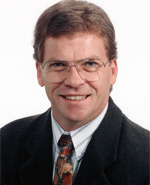 The Society for Neuroscience (SfN) has presented its Science Educator Award to James E. Olson, Ph.D., professor of emergency medicine and neuroscience, cell biology and physiology, at the Wright State University Boonshoft School of Medicine. The award was presented at SfN’s annual meeting Neuroscience 2010, held recently in San Diego.
The Society for Neuroscience (SfN) has presented its Science Educator Award to James E. Olson, Ph.D., professor of emergency medicine and neuroscience, cell biology and physiology, at the Wright State University Boonshoft School of Medicine. The award was presented at SfN’s annual meeting Neuroscience 2010, held recently in San Diego.
The Society for Neuroscience founded the Science Educator Award in 2003 to recognize an outstanding neuroscientist who has made significant contributions in promoting public education and awareness about the field.
According to SfN, Olson has worked diligently to promote the inclusion of neuroscience topics in state and national Science Olympiad competitions. His efforts have introduced grade-specific neuroscience education to over 5,000 middle schools and high schools across the United States. He currently helps define health science and anatomy events as a member of Science Olympiad’s Biological and Life Sciences Committee, ensuring that neuroscience topics will be included in the Science Olympiad curriculum.
Olson rarely misses an opportunity to promote the study of neuroscience. In addition to serving as a research mentor for students and resident physicians in the medical school, he has delivered lectures for general audiences through Wright State’s Mini-Medical School program. What he enjoys most, however, is introducing young learners around the country to the wonders of neuroscience through his work with Science Olympiad.
An international nonprofit organization, Science Olympiad strives to interest K-12 students in science and improve science education. Each year, an estimated 150,000 students from more than 14,000 schools participate in Science Olympiad activities. At the middle and high school level, students form teams to compete in 23 fun, yet challenging, science-based events during local, state, and national tournaments.
As a Science Olympiad coach, Olson has worked with local middle and high school students for several years teaching cell biology and genetics. In addition, he created a program called “Neuroscience (This is your brain)” that was used in regional competitions across Ohio and adopted as a national trial event.
The Society for Neuroscience is an organization of more than 40,000 researchers and clinicians who study the brain and nervous system.
“The science education awards are important for recognizing the outreach efforts of neuroscientists at all stages of their careers,” said Michael E. Goldberg, M.D., president of SfN.
